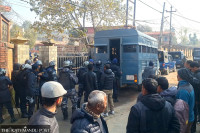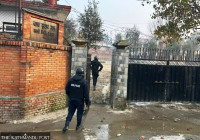Valley
Govt struggling to hire specialist doctors
The Health Ministry is struggling to hire specialist doctors because of low government pay and rural deputation.
Manish Gautam
The Health Ministry is struggling to hire specialist doctors because of low government pay and rural deputation. Despite announcing the vacancies repeatedly, very few doctors have applied for government jobs, hampering the ministry’s plans to provide specialty services from various district and other state-run hospitals.
For instance, the ministry announced 117 vacancies of doctors on Friday, the second search in four months for specialist health workers. When it first sought to appoint 158 specialist doctors on November 3, 2016, only 135 applied. Vacancies for medical generalists saw zero applicants while there were only five anaesthesia job seekers. Two of them were selected for appointment but they immediately declined the offer after they were asked to serve outside Kathmandu.
Among the 158 specialists called to join the first time, the ministry was able to hire only 41 doctors. It is now planning to hire the remaining 117 doctors with the process that began on Friday. “We find it hard to attract specialists to government hospitals,” said Bhogendra Dotel, the Health Ministry spokesperson.
In the new announcement, the ministry is seeking to hire specialist doctors including general physicians, anaesthesiologists, medical generalists, radiologists, surgeons and paediatricians. Those wanted are 10 doctors of general medicine; six of otorhinolaryngology (Ear Nose Throat specialist); 25 medical generalists; 22 anesthesiologists; 12 radiologists; eight general surgeons; six dermatologists; 13 obstetricians and gynaecologists; three orthopaedic surgeons and 12 paediatricians.
Officials point out multiple reasons ranging from low pay to mandatory rural deputation for specialist doctors’ lack of interest in the government jobs. The problem is severe in areas of anaesthesia, general medicine and radiology, where the country produces fewer graduates who are immediately sucked up by the mushrooming private health facilities in and outside Kathmandu. Many of the hospitals provide lucrative monthly salaries of around Rs200,000 to Rs300,000 and additional hours of private practice further their income.
With PG courses getting more expensive—some including radiology cost around Rs10 million, new post-graduates are not interested to work for the government, which they believe pays less than private hospitals.
Instead of government hospitals, many specialist doctors prefer some of the autonomous health institutions such as the BP Koirala Institute of Health Sciences (BPKIHS) in Dharan and the Patan Academy of Health Sciences, which provide salary and perks at par with the private facilities. For example, the same specialist doctor is paid around Rs35,000 in government hospitals whereas the BPKIHS pays up to Rs200,000.
Dr Raamesh Koirala, whose team recently submitted its report on revamping health services to the ministry, said an assistant professor at the BPKIHS, just like the level nine doctors that the government is seeking, gets Rs65,400 salary with 100 percent additional allowance. With the perks, their monthly pay check is worth around Rs145,340.
Following the report, the ministry has decided to provide 50 percent extra incentives to specialist doctors. Yet, the offer is far from attractive.
Another reason for such dearth of specialists is the disparity in their production—for around 2,500 MBBS graduates each year, there are only around 500 PG seats. While the undergraduate programmes in the medical field are making impressive strides in the country, the government’s inability to increase the PG seats has been a key factor forcing many—who do not work with the government—to go abroad for specialised medical degrees.
Health Minister Gagan Thapa said they see this shortfall as an opportunity to expand post-graduate courses to several big hospitals outside Kathmandu Valley. “Since the recent vacancies are for contract service, they might not be interested in short appointments,” said the minister. “Even for permanent specialist doctors, we are working to provide more incentives. Besides, post-graduate courses will be expanded to many regional and zonal hospitals.”
According to the plan, the National Academy of Medical Sciences will recognise the government hospitals as teaching facilities, allowing them to run postgraduate courses. Senior doctors at the hospitals would be appointed as professors and other required faculty members managed before running the course as per the criteria of the Nepal Medical Council, which regulates medical education in the country. The programme is likely to begin in June/July this year. Minister Thapa said students who are enrolled in a PG course will first have to sign a bond of service in specified districts on completion of their studies.




 11.12°C Kathmandu
11.12°C Kathmandu












